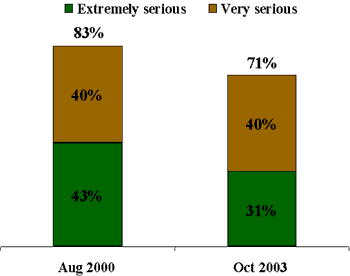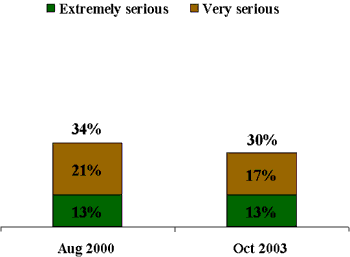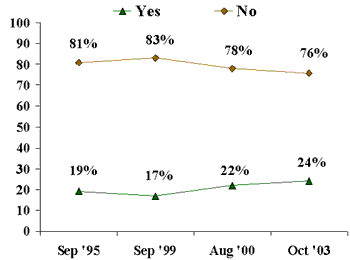GALLUP NEWS SERVICE
PRINCETON, NJ -- The problem of drug abuse has moved back onto the front page of the nation's newspapers with the recent admission by high-profile conservative radio talk show host Rush Limbaugh that he is addicted to prescription pain medication. Limbaugh is reportedly under investigation for allegedly purchasing thousands of prescription painkillers illegally. Limbaugh is now in a 30-day treatment center, which marks his third attempt to break his habit, according to a statement he released.
According to a recent Gallup Poll, the news accounts of Limbaugh's drug problems are particularly relevant to about a quarter of Americans who report that drugs have also caused problems in their families in the past -- almost as many who say alcohol has been a source of problems. The poll shows that while a large majority of Americans describe the nation's drug problem as extremely or very serious, the percentage saying so has dropped substantially since 2000. However, only about 3 in 10 respondents say drugs are an extremely or very serious problem in their local communities. When the public is asked about the amount of progress made in dealing with the nation's drug problem, a slight plurality of Americans say the nation has made progress, although substantial percentages feel the nation has stood still or even lost ground.
Drug Problems in the United States
The Oct. 6-8 Gallup Poll shows a large decline in the percentage of respondents reporting drugs to be at least a very serious problem in the country, when compared to the percentages who said so in 2000. Roughly 7 in 10 Americans now rate the drug problem in the United States as extremely (31%) or very serious (40%). This represents a 12-point decline since 2000, when more than 8 in 10 viewed the country's drug problems this way (43% extremely and 40% very serious).
| Overall, how would you describe the problem of drugs in the United States -- is it extremely serious, very serious, moderately serious, not too serious, or not serious at all? |
 |
The drop in top-of-mind relevance of the drug problem in the United States is also illustrated by an analysis of responses to Gallup's "most important problem" question. In five separate Gallup Polls conducted in mid-1989 through mid-1990, more Americans named drugs as the country's top problem than any other issue -- due undoubtedly to the high-profile focus on the war against drugs at that time. At other points in the 1990s, smaller, but still substantial numbers of Americans mentioned drugs as the top problem. In the fall of 2000, the number of Americans mentioning drugs stood at 5%. In the Oct. 6-8 poll, just 2% mention drugs, while much larger percentages mention the economy, terrorism, or issues relating to war as the major concern.
When asked to describe the seriousness of the drug problem in their local communities, Americans are far less likely to describe it as extremely or very serious. Only 3 in 10 Americans say drugs are a serious problem in their area (13% extremely and 17% very serious). These results show only a slight decline in perceived seriousness over the past three years. It is common for Americans to perceive conditions in their local communities much more positively than they view conditions in the United States, more generally.
| Overall, how would you describe the problem of drugs in the area where you live -- is it extremely serious, very serious, moderately serious, not too serious, or not serious at all? |
 |
The poll shows some interesting differences by demographic and geographic subgroups on these measures:
- Younger Americans are substantially less likely than older
Americans to view the nation's drug problem as a serious issue.
Fifty-nine percent of 18- to 29-year-olds describe the nation's
drug problem as extremely or very serious, while 69% of 30- to
49-year-olds and 80% of people aged 50 and older feel this way.
There are essentially no differences among the various age groups
on the problem of drugs in their local areas.
- Women are somewhat more inclined than men to view the drug
problem as serious both nationally and locally. More than three in
four women (77%) say the drug problem in the United States is
extremely or very serious, compared with only about two-thirds of
men (65%) who say the same. Similarly, roughly one in three women
(34%) say the drug problem in their local area is serious, compared
with a quarter of men (25%) who say so.
- Somewhat surprisingly, Americans living in rural areas are much
more likely than suburbanites or urbanites to describe the drug
problem in their local area as an extremely or very serious
problem. More than 4 in 10 Americans living in a rural setting
(42%) say the drug problem in their area is a serious problem,
compared with a third of respondents living in an urban setting
(32%), and roughly one in five living in a suburban setting
(22%).
Public Divided on Amount of Progress Made With Illegal Drugs
Americans aren't overly optimistic when asked to assess the amount of progress the United States has made in dealing with the problem of illegal drugs. A plurality, 38%, say the United States has made progress, but 32% say it has stood still and 28% say it has lost ground. Americans are somewhat more pessimistic than when last asked about this in 2000; fewer say the United States has made progress and more say the progress is at a standstill.
Perceptions of progress in the drug war have fluctuated substantially since Gallup first queried the public on this topic in 1972. Americans were most optimistic about progress with the nation's drug problem in 1999 (46% saying made progress), but were most pessimistic exactly one year earlier (with 46% saying lost ground).
|
How much progress do you feel the nation has made over the last year or two in coping with the problem of illegal drugs -- Has it made much progress, made some progress, stood still, lost some ground, or lost much ground? |
|||
|
Made |
Stood |
Lost |
|
|
% |
% |
% |
|
|
2003 Oct 6-8 |
38 |
32 |
28 |
|
2000 Aug 29-Sep 5 |
47 |
23 |
29 |
|
1999 Sep 23-26 |
46 |
27 |
26 |
|
1996 Nov 21-24 |
31 |
22 |
46 |
|
1995 Sep 14-17 |
38 |
30 |
30 |
|
1976 Jun |
27 |
29 |
40 |
|
1974 Apr |
40 |
21 |
35 |
|
1972 May |
35 |
20 |
41 |
One in Four Report Drugs Have Caused "Trouble" in the Family
Nearly a quarter of Americans, 24%, say drugs have been a cause of problems in their families at some time. The current results show essentially no change over the past three years, but does show a slight five-point increase since 1995. By way of comparison, a slightly larger percentage of adults -- 31% -- report that the consumption of alcoholic beverages has been a cause of trouble in their families.
| Has drug abuse ever been a cause of trouble in your family? |
 |
Again, results show some interesting differences by demographic subgroups on this measure:
- Younger Americans are more likely to report drug problems
within their families than older Americans are -- 31% among adults
aged 18 to 29, compared with 25% aged 30 to 49, 25% who are 50 to
64, and only 10% among those 65 and older.
- Women are slightly more likely than men to say that drugs have been a cause of problems in their families -- 28% vs. 18%, respectively.
Survey Methods
The results below are based on telephone interviews with a randomly selected national sample of 1,017 adults, aged 18 and older, conducted Oct. 6-8, 2003. For results based on this sample, one can say with 95% confidence that the maximum error attributable to sampling and other random effects is ±3 percentage points. In addition to sampling error, question wording and practical difficulties in conducting surveys can introduce error or bias into the findings of public opinion polls.
Overall, how would you describe the problem of drugs [ROTATED: in the United States/in the area where you live] -- is it extremely serious, very serious, moderately serious, not too serious, or not serious at all? How would you describe the problem of drugs …
In the United States
|
|
|
|
|
Not |
|
|
|
2003 Oct 6-8 |
31% |
40 |
24 |
3 |
1 |
1 |
|
2000 Aug 29-Sep 5 |
43% |
40 |
15 |
1 |
1 |
* |
In the area where you live
|
|
|
|
|
Not |
|
|
|
2003 Oct 6-8 |
13% |
17 |
36 |
22 |
11 |
1 |
|
2000 Aug 29-Sep 5 |
13% |
21 |
39 |
19 |
6 |
2 |
Now, how much progress do you feel the nation has made over the last year or two in coping with the problem of illegal drugs -- Has it made much progress, made some progress, stood still, lost some ground, or lost much ground?
|
Made |
Made |
|
Lost |
Lost |
|
|
|
% |
% |
% |
% |
% |
% |
|
|
2003 Oct 6-8 |
3 |
35 |
32 |
17 |
11 |
2 |
|
2000 Aug 29-Sep 5 |
6 |
41 |
23 |
17 |
12 |
1 |
|
1999 Sep 23-26 |
4 |
42 |
27 |
14 |
12 |
1 |
|
1996 Nov 21-24 |
3 |
28 |
22 |
24 |
22 |
1 |
|
1995 Sep 14-17 |
2 |
36 |
30 |
19 |
11 |
2 |
|
1976 Jun |
2 |
25 |
29 |
25 |
15 |
4 |
|
1974 Apr |
4 |
36 |
21 |
19 |
16 |
5 |
|
1972 May |
3 |
32 |
20 |
21 |
20 |
5 |
Has drug abuse ever been a cause of trouble in your family?
|
Yes |
No |
No opinion |
|
|
% |
% |
% |
|
|
2003 Oct 6-8 |
24 |
76 |
* |
|
2000 Aug 29-Sep 5 |
22 |
78 |
* |
|
1999 Sep 23-26 |
17 |
83 |
* |
|
1995 Sep 14-17 |
19 |
81 |
* |